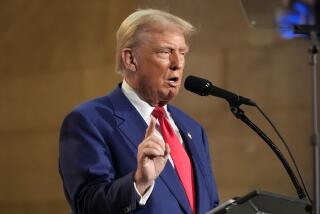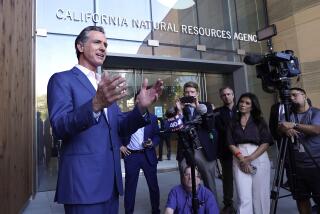U.S. to reduce oil imports by a third by 2021, Obama says
President Obama on Wednesday outlined a plan to reduce oil imports to the United States by a third over the next 10 years, calling for further oil and gas drilling at home, development of biofuels and greater fuel efficiency in new cars and trucks.
With gas prices climbing largely because of unrest in the Middle East, the White House appeared eager to defuse Republican criticism about the pain that high fuel prices have inflicted on ordinary Americans and alleged inaction on the issue by the administration.
“To his credit, the president swung back when Democrats often won’t do that, so as not to allow the Republicans to hijack the energy issue,” said a senior Democratic congressional staffer who declined to be identified because he is not authorized to be quoted by the media.
Obama vowed to reduce imports in part by accelerating domestic production of oil and gas on millions of acres that oil companies had leased but not drilled on. He also called for using natural gas and biofuels, including ethanol, as a replacement for gasoline in vehicles, and will direct federal agencies to buy 100% alternative fuel vehicles by 2015. The president asserted that all forms of power generation must remain under consideration, including nuclear power, despite the nuclear crisis in Japan.
The U.S. imported about 11 million of the nearly 20 million barrels a day it consumed in 2008, the year the president is using as his oil reduction benchmark.
Although independent experts said they heard little new in the speech, Obama’s appearance before a friendly crowd at Georgetown University focused the nation’s wide-ranging efforts in energy production and fuel efficiency on the single goal of reducing oil imports.
A sustained period of high gasoline prices could hamper the fragile economic recovery and complicate Obama’s chances for reelection.
The president set a high bar for himself that previous administrations have been unable to clear. Since the Nixon administration, every president has pledged to reduce the United States’ dependence on foreign oil, without success.
“Presidents and politicians of every stripe have promised energy independence, but that promise has so far gone unmet,” Obama said. “We cannot keep going from shock when energy prices go up to trance when they go down on the issue of energy security.”
The United States is the third-largest oil producer in the world and it consumes about a quarter of the world’s daily oil output. But its share of proven reserves is only 2%.
Obama emphasized that such small reserves mean that the United States could not drill its way to energy independence. But he said his plan would make the United States more reliant on domestic production and oil and gas from allies in the Western Hemisphere, and trim demand for crude oil by increasing vehicles’ fuel efficiency and encouraging the use of biofuels.
Implicit in the speech was the U.S. desire to lessen its dependence on the autocracies of the Middle East, which account for a major share of global oil production.
“It doesn’t seem to be anything serious to actually reduce the consumption of oil, like a gasoline tax,” said F. Gregory Gause III, professor of political science at the University of Vermont. “I don’t think they will take it particularly seriously” in the Middle East.
Most oil industry trade groups and Republican politicians criticized the speech for not doing enough to open new territories to oil and gas drilling and for not speeding up approval of drilling permits to the levels where they were before the oil spill in the Gulf of Mexico.
In a highly partisan political climate, the administration may have to rely on executive orders to carry out some of its program.
In the area of increased fuel efficiency, the federal government, the car companies and the state of California have worked together to boost gas mileage in new cars after decades of congressional inaction on the issue. Congress, however, is mulling legislation that would block such efforts past 2016.
More to Read
Inside the business of entertainment
The Wide Shot brings you news, analysis and insights on everything from streaming wars to production — and what it all means for the future.
You may occasionally receive promotional content from the Los Angeles Times.











